Matt Rees's Blog, page 7
June 22, 2013
The Caravaggio masterpieces that make up the cover of historical novel
The cover of my Caravaggio novel, A Name in Blood, out now in UK paperback, is a composite of two works by the great Italian master....
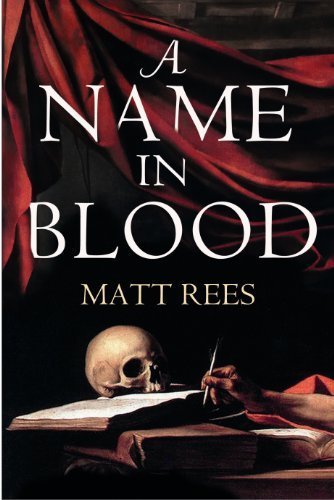
...There's the skull from St. Jerome Writing, painted in 1606 in Rome and still housed in that city at the Galleria Borghese...
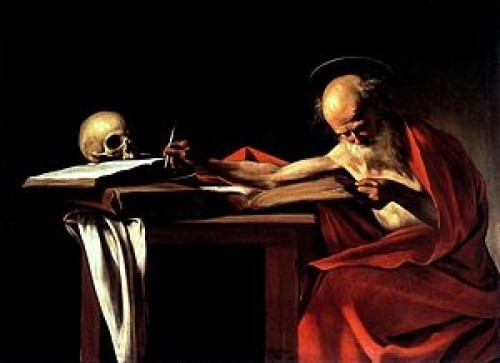
...and, completed in the same year but with distrous results for Caravaggio's career and mental health, The Death of the Virgin. Now in the Louvre, my novel's cover includes the luxurious canopy above the otherwise humble bed of Mary. It was a scandalous piece at the time. Usually the Virgin was portrayed ascending to Heaven. Here she's dying like any peasant woman.
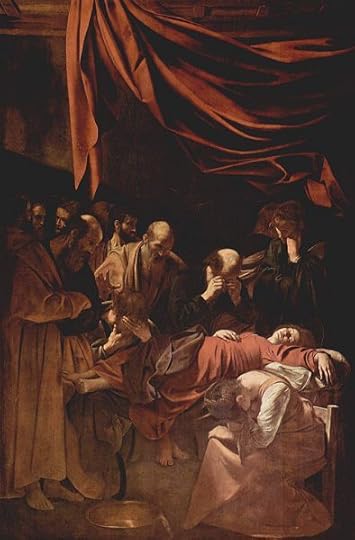

...There's the skull from St. Jerome Writing, painted in 1606 in Rome and still housed in that city at the Galleria Borghese...

...and, completed in the same year but with distrous results for Caravaggio's career and mental health, The Death of the Virgin. Now in the Louvre, my novel's cover includes the luxurious canopy above the otherwise humble bed of Mary. It was a scandalous piece at the time. Usually the Virgin was portrayed ascending to Heaven. Here she's dying like any peasant woman.

Published on June 22, 2013 05:38
•
Tags:
caravaggio, covers, crime-fiction, food, historical-fiction, italy, rome
June 18, 2013
5 Places to Eat in Rome You Mustn't Miss
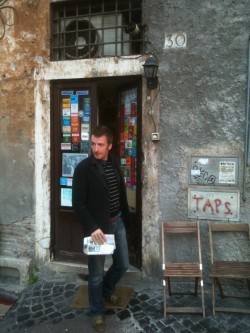 I've spent a lot of time in Rome over the years, including an extended period to research my novel about the great artist Caravaggio, A Name in Blood. Even a writer's got to eat, so here are the unmissable eateries of the eternal city.
I've spent a lot of time in Rome over the years, including an extended period to research my novel about the great artist Caravaggio, A Name in Blood. Even a writer's got to eat, so here are the unmissable eateries of the eternal city.1. Sora Margherita. Piazza delle Cinque Scole. Looks like a scene from Fellini's Roma, with rough decor, unrestrained atmosphere, and a focus on good food rather than "fine dining." Order anything, it's great. And don't leave food on your plate. The waitress will make you finish it.
2. San Crispino, Piazza della Maddalena and Via della Panneteria. Ice-cream is usually displayed in Rome in massive piles that are supposed to make it irresistible. At San Crispino, they keep the ice-cream under silver covers. But the taste truly is impossible to resist. The house flavor is honey, but the selection is always different. One day there'll be whisky, the next you'll find licorice. I've heard people complain that it's expensive. But as Martin Cruz Smith once said, "You don't sell a ride on a rocket shit for a dollar."
3. Il Fornaio. Via dei Baullari. Near Campo de'Fiori, this bakery/deli has excellent pizza and savories. But if you'd like a sugar-high that won't give you a gelato head-freeze, this is the place. The torta con ricotta e ciocollata is officially designated "the best thing in the world" by my five-year-old son.
4. Obika Mozzarella Bar. Campo de'Fiori, and Piazza Firenze. A chain that has expanded into the UK and USA. But there's nowhere to enjoy it that's better than Rome. A tasting menu of several different mozzarellas comes with a lesson from the staff about what makes a good mozzarella. (If you press it and thin white liquid comes out, it's fresh; if not, blaaah.) Also a great place for morning espresso and pastry.
5. Osteria della Quercia. Piazza della Quercia. In a tiny piazza opposite the Renaissance palazzo where the Council of State sits, in the shade of the oak tree from which it takes its name. A great place for traditional Roman food like deep fried cod and artichokes.
Published on June 18, 2013 01:36
•
Tags:
caravaggio, crime-fiction, food, historical-fiction, italy, rome
June 13, 2013
Share this on FB to win free signed copy of my Caravaggio novel
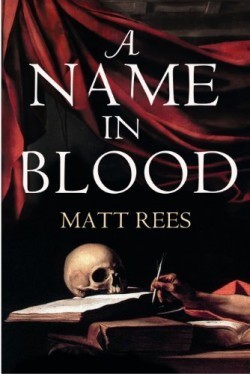 My historical thriller A Name in Blood, which is about the great Italian artist Caravaggio, will be out in a small-format UK paperback in two weeks. Pre-order it for a special discount at amazon.co.uk, from Waterstone's, or from Foyle's.
My historical thriller A Name in Blood, which is about the great Italian artist Caravaggio, will be out in a small-format UK paperback in two weeks. Pre-order it for a special discount at amazon.co.uk, from Waterstone's, or from Foyle's. Rees illuminates with sensitivity the hitherto dark portrait of one of the world’s most influential artists. –Daily Mail
A superb tale of intrigue and wrong doing in Renaissance Italy–It’s a Crime! blog
Matt Rees inhabits Caravaggio’s mind…bringing to life his conflicted world–The Bookbag
Read the first chapter.
Published on June 13, 2013 23:54
•
Tags:
art-history, caravaggio, competition, free-book, historical-crime, historical-fiction, italy
June 10, 2013
10 Historical Thrillers You'd Better Read
Naturally I'm assuming you've already read Mozart's Last Aria and A Name in Blood, my historical thrillers about the great composer and about Caravaggio....So here's the best of the rest!
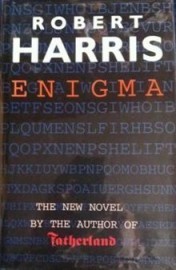 1. Enigma. Robert Harris.
1. Enigma. Robert Harris.
A thrilling dramatization of the British battle to break German codes during World War II. It's tough to say whether this is better than Harris's Archangel -- in fact, I think it's probably not -- but this is set entirely in a historical period, whereas Archangel takes place in the present (with a couple of characters who might be said to be living in the past). So I'm including Enigma here.
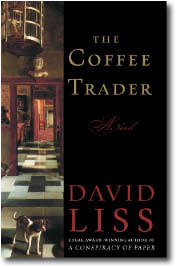 2. The Coffee Trader. David Liss.
2. The Coffee Trader. David Liss.
Liss is the premier writer of crime fiction set during the early modern period. Here he takes on the Inquisition and Jewish life in Holland, in a story that revolves around the newly introduced, mind-bending drug known as coffee.
3. The Alienist. Caleb Carr
When I first read The Alienist, I was living in Manhattan in my twenties. Naturally I was out on the town most of the time. So I only got to read late at night before bed. This was a very poor choice of book for those circumstances. I'm not ashamed to reveal that I used to put out the light and dive under the covers to hide, haunted by the tale of gruesome murders in 1896 New York. It might've been the drugs, but I think it was because of the book. Quite the scariest thing I've ever read, it also introduces early stages of forensic science to the plot.
4. Cain His Brother. Anne Perry
The best of Perry's Monk series, set in Victorian London. A disturbing story of brothers engaged in dreadful deeds that reminds me of the Strange Case of Dr. Jeckyll and Mr. Hyde in its conjoining of tormented psychology with depraved city.
 5. The Silence. J. Sydney Jones
5. The Silence. J. Sydney Jones
In this marvelous novel the real mayor of Vienna at the onset of the twentieth century, Karl Lueger, is at the heart of a conspiracy to raise big money from the sale of the Vienna Woods and at the same time to gain political capital by blaming Jewish property developers for the destruction of the city’s beloved green belt. It’s a measure of Jones’s skill as a writer that, while his hero is a lawyer-turned-investigator of Jewish origin, the novel’s Jews are not really better or worse than the society around them. They aren’t portrayed as poor saintly victims. They’re simply part of Jones’s Vienna, as they were part of historical Vienna. There’s also a youthful role for little Ludwig Wittgenstein. For lovers of Sherlock Holmes, you can't go wrong with Jones.
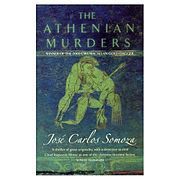 6. The Athenian Murders. Jose Carlos Somoza
6. The Athenian Murders. Jose Carlos Somoza
A deeply engaging story told by the ancient Greek translator of a still more ancient Greek manuscript. The manuscript is a murder mystery. The translator becomes entangled in the mystery. Philosophy ensues... It won the CWA Gold dagger a dozen years ago.
7. Sandman. J. Robert Janes
Janes's series set in World War II revolves around a French police detective and his colleague from the Gestapo. Like the other novels, this one is highly elliptical -- a perfect reflection of the delicate line these two investigators must tread if they aren't to fall foul of the Nazi rulers of Paris.
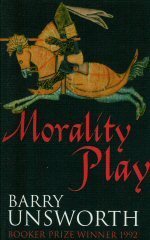 8. Morality Play. Barry Unsworth
8. Morality Play. Barry Unsworth
Medieval actors create a play about a murder recently solved in the northern English town where they're staying. As they perform the play, they realize the wrong person has been found guilty. One of the greatest books by Unsworth, who died last year and whose ability to capture a moment or a character in a phrase is unparalleled in recent literature.
 9. The Bridge of Sighs. Olen Steinhauer
9. The Bridge of Sighs. Olen Steinhauer
The first of Steinhauer's terrific series chronicling the Communist decades of eastern Europe. The restraint with which he writes -- and his characters behave -- truly does make this a very Le Carre experience. (I know it's pretty common to say that this or that writer is "the new Le Carre." It seems to me that Le Carre himself stopped being "Le Carre" a few decades ago. Maybe he transmigrated into these early books by Steinhauer...)
10. Ragtime in Simla. Barbara Cleverley
Set in 1922 in Simla, the summer retreat of the British in India, Cleverley exposes the seamy underside of what was at the time the Jewel in the Crown.
 1. Enigma. Robert Harris.
1. Enigma. Robert Harris.A thrilling dramatization of the British battle to break German codes during World War II. It's tough to say whether this is better than Harris's Archangel -- in fact, I think it's probably not -- but this is set entirely in a historical period, whereas Archangel takes place in the present (with a couple of characters who might be said to be living in the past). So I'm including Enigma here.
 2. The Coffee Trader. David Liss.
2. The Coffee Trader. David Liss.Liss is the premier writer of crime fiction set during the early modern period. Here he takes on the Inquisition and Jewish life in Holland, in a story that revolves around the newly introduced, mind-bending drug known as coffee.
3. The Alienist. Caleb Carr
When I first read The Alienist, I was living in Manhattan in my twenties. Naturally I was out on the town most of the time. So I only got to read late at night before bed. This was a very poor choice of book for those circumstances. I'm not ashamed to reveal that I used to put out the light and dive under the covers to hide, haunted by the tale of gruesome murders in 1896 New York. It might've been the drugs, but I think it was because of the book. Quite the scariest thing I've ever read, it also introduces early stages of forensic science to the plot.
4. Cain His Brother. Anne Perry
The best of Perry's Monk series, set in Victorian London. A disturbing story of brothers engaged in dreadful deeds that reminds me of the Strange Case of Dr. Jeckyll and Mr. Hyde in its conjoining of tormented psychology with depraved city.
 5. The Silence. J. Sydney Jones
5. The Silence. J. Sydney JonesIn this marvelous novel the real mayor of Vienna at the onset of the twentieth century, Karl Lueger, is at the heart of a conspiracy to raise big money from the sale of the Vienna Woods and at the same time to gain political capital by blaming Jewish property developers for the destruction of the city’s beloved green belt. It’s a measure of Jones’s skill as a writer that, while his hero is a lawyer-turned-investigator of Jewish origin, the novel’s Jews are not really better or worse than the society around them. They aren’t portrayed as poor saintly victims. They’re simply part of Jones’s Vienna, as they were part of historical Vienna. There’s also a youthful role for little Ludwig Wittgenstein. For lovers of Sherlock Holmes, you can't go wrong with Jones.
 6. The Athenian Murders. Jose Carlos Somoza
6. The Athenian Murders. Jose Carlos SomozaA deeply engaging story told by the ancient Greek translator of a still more ancient Greek manuscript. The manuscript is a murder mystery. The translator becomes entangled in the mystery. Philosophy ensues... It won the CWA Gold dagger a dozen years ago.
7. Sandman. J. Robert Janes
Janes's series set in World War II revolves around a French police detective and his colleague from the Gestapo. Like the other novels, this one is highly elliptical -- a perfect reflection of the delicate line these two investigators must tread if they aren't to fall foul of the Nazi rulers of Paris.
 8. Morality Play. Barry Unsworth
8. Morality Play. Barry UnsworthMedieval actors create a play about a murder recently solved in the northern English town where they're staying. As they perform the play, they realize the wrong person has been found guilty. One of the greatest books by Unsworth, who died last year and whose ability to capture a moment or a character in a phrase is unparalleled in recent literature.
 9. The Bridge of Sighs. Olen Steinhauer
9. The Bridge of Sighs. Olen SteinhauerThe first of Steinhauer's terrific series chronicling the Communist decades of eastern Europe. The restraint with which he writes -- and his characters behave -- truly does make this a very Le Carre experience. (I know it's pretty common to say that this or that writer is "the new Le Carre." It seems to me that Le Carre himself stopped being "Le Carre" a few decades ago. Maybe he transmigrated into these early books by Steinhauer...)
10. Ragtime in Simla. Barbara Cleverley
Set in 1922 in Simla, the summer retreat of the British in India, Cleverley exposes the seamy underside of what was at the time the Jewel in the Crown.
Published on June 10, 2013 01:24
•
Tags:
crime-fiction, historical-fiction, historical-thrillers, lists
June 7, 2013
Podcast: A Grave in Gaza
I talk about the real events in Gaza that are the basis for my second Palestinian crime novel A GRAVE IN GAZA (UK title: THE SALADIN MURDERS.) Over a decade reporting on Gaza, I accumulated stories that few other reporters noticed. In this novel, Palestinian sleuth Omar Yussef faces the corruption of senior Palestinian security officials, the kidnapping of colleagues, and the smuggling of missiles under the Egyptian border into Gaza. Each of the characters is based on a real Palestinian I've known. I also read from the opening chapter.
Download the Podcast: (Download the MP3)
Subscribe via iTunes
Download the Podcast: (Download the MP3)
Subscribe via iTunes
Published on June 07, 2013 01:45
•
Tags:
crime-fiction, detective-fiction, exotic-fiction, gaza, israel, middle-east, mystery-fiction, palestine, palestinians
June 5, 2013
Podcast: Yoga for Writers
I use yoga and meditation to prepare myself for the mental and physical challenge of writing. I introduce this podcast by talking about the importance of yoga and how it helps to open a writer's creativity, and to prevent fatigue from sitting for long periods. I describe several stretching techniques you can do throughout your writing day. Then I talk you through a 20 minute yoga practice sequence for you to follow along with the exercises. The postures should leave you feeling energized and creative -- ready to write!
Download the Podcast: (Download the MP3)
Subscribe via iTunes
Download the Podcast: (Download the MP3)
Subscribe via iTunes
Published on June 05, 2013 03:28
•
Tags:
podcast, writers, writing, yoga, yoga-for-writers
June 4, 2013
Podcast: The Collaborator of Bethlehem
My award-winning first novel was THE COLLABORATOR OF BETHLEHEM (UK title: THE BETHLEHEM MURDERS). Set against the backdrop of the Palestinian intifada, it tells the story of schoolteacher Omar Yussef, who is forced to take on the violence of his hometown to save a former pupil. In this podcast, I lay out how I came to write the book and read from the first chapter.
Download the Podcast: (Download the MP3)
Subscribe via iTunes
Download the Podcast: (Download the MP3)
Subscribe via iTunes
Published on June 04, 2013 01:48
•
Tags:
bethlehem, crime-fiction, israel, middle-east, palestine, palestinians, podcasts, readings
June 3, 2013
Omar Yussef crime novels now in omnibus ebook edition
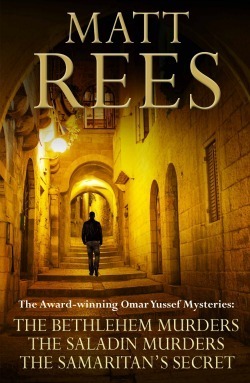 My UK publisher Atlantic is bringing out a special omnibus edition ebook of the first three Omar Yussef novels in my Palestine Quarter. Let's call it an Omarnibus. The first of these books, The Bethlehem Murders (US title: The Collaborator of Bethlehem), won the Crime Writers Association New Blood Dagger. It introduces Omar Yussef, a Bethlehem schoolteacher who must face down the violent gangs of his hometown to save a former student. We follow Omar to Gaza in The Saladin Murders (US: A Grave in Gaza), where he tracks a kidnapped colleague and a smuggled rocket, and Nablus in The Samaritan's Secret, which involves repressed sexuality, the battle between Palestinian factions in the casbah, the ancient community of the Samaritans, and a very sugary local dessert. Get The Award-winning Omar Yussef Mysteries: The Bethlehem Murders, The Saladin Murders and The Samaritan's Secret.
My UK publisher Atlantic is bringing out a special omnibus edition ebook of the first three Omar Yussef novels in my Palestine Quarter. Let's call it an Omarnibus. The first of these books, The Bethlehem Murders (US title: The Collaborator of Bethlehem), won the Crime Writers Association New Blood Dagger. It introduces Omar Yussef, a Bethlehem schoolteacher who must face down the violent gangs of his hometown to save a former student. We follow Omar to Gaza in The Saladin Murders (US: A Grave in Gaza), where he tracks a kidnapped colleague and a smuggled rocket, and Nablus in The Samaritan's Secret, which involves repressed sexuality, the battle between Palestinian factions in the casbah, the ancient community of the Samaritans, and a very sugary local dessert. Get The Award-winning Omar Yussef Mysteries: The Bethlehem Murders, The Saladin Murders and The Samaritan's Secret.
Published on June 03, 2013 03:49
•
Tags:
crime-fiction, exotic-crime, israel, middle-east, omar-yussef, palestine, palestinians
April 4, 2013
Salon: Check out 'Psychobibi'
A great piece on Salon.com highlighting the relationship between the two Bs, Bibi and Barack cites my new ebook
PSYCHOBIBI
: Who is Israel's Prime Minister and Why Does He Want to Fail?: "Netanyahu’s often clumsy outreach to the United States and his image, in Israel, as a complex figure with a dark and possibly unfathomable mind is the subject of a new book, PSYCHOBIBI."
Published on April 04, 2013 01:41
•
Tags:
barack-obama, biography, israel, middle-east, netanyahu, palestinians
March 21, 2013
Psychobibi: Neurotic King of Israel
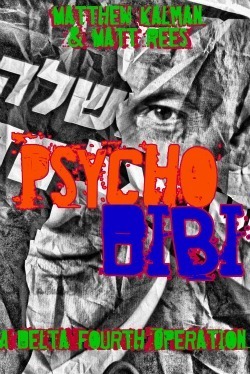 Like Barack Obama, who's in Israel now for some chinwagging, I've met Bibi Netanyahu many times. Like Barack Obama, I know that there's something almost unfathomably complex going on inside the man's head. By the end of his trip to Israel, Barack Obama might be ready to write a book called PSYCHOBIBI. Unfortunately for him, I got there first.
Like Barack Obama, who's in Israel now for some chinwagging, I've met Bibi Netanyahu many times. Like Barack Obama, I know that there's something almost unfathomably complex going on inside the man's head. By the end of his trip to Israel, Barack Obama might be ready to write a book called PSYCHOBIBI. Unfortunately for him, I got there first.In PSYCHOBIBI I write with Matthew Kalman about the psychological struggles behind the Israeli leader's self-destructivenes. We get deep inside Bibi's psyche by using telling moments from our many meetings with him over the years. Here's an example that didn't make it into the ebook:
I once spent a day with Bibi touring polling stations on election day. It was the typical compact between a politician and a journalist. The journalist gets access; the politician gets covered, gets publicity. Bibi gave me that. But in the style to which I've become accustomed, he undercut himself.
At the end of the day, we went to a memorial service for his mother. We picked up his wife and sons en route. At the service, my photographer had them pose, offering to take a family picture to send along to Bibi. As he gathered his wife and children around him, Bibi said: "Come on. Let's get something out of all this."
As if the politician-journalist compact didn't exist. Or was beneath him.
I didn't care. But there are plenty of journalists who'd have felt scorned or humiliated by the breaking of the compact. Because if the one side thinks it's not getting anything (or says so), then it makes the journalist a cynical user. (Which we are, but we don't like to be confronted with it.) Of course, the real reason was that he had to hit out at someone because he was about to meet his father. That's a factor at the heart of Psychobibi...
The man I call Psychobibi does this kind of thing all the time in his political life, too. It colors his diplomacy and his interactions with other Israeli politicians and international figures. In PSYCHOBIBI, we show exactly why Bibi does it.
Published on March 21, 2013 04:00
•
Tags:
biography, diplomacy, israel, jewish-history, middle-east, netanyahu, politics



